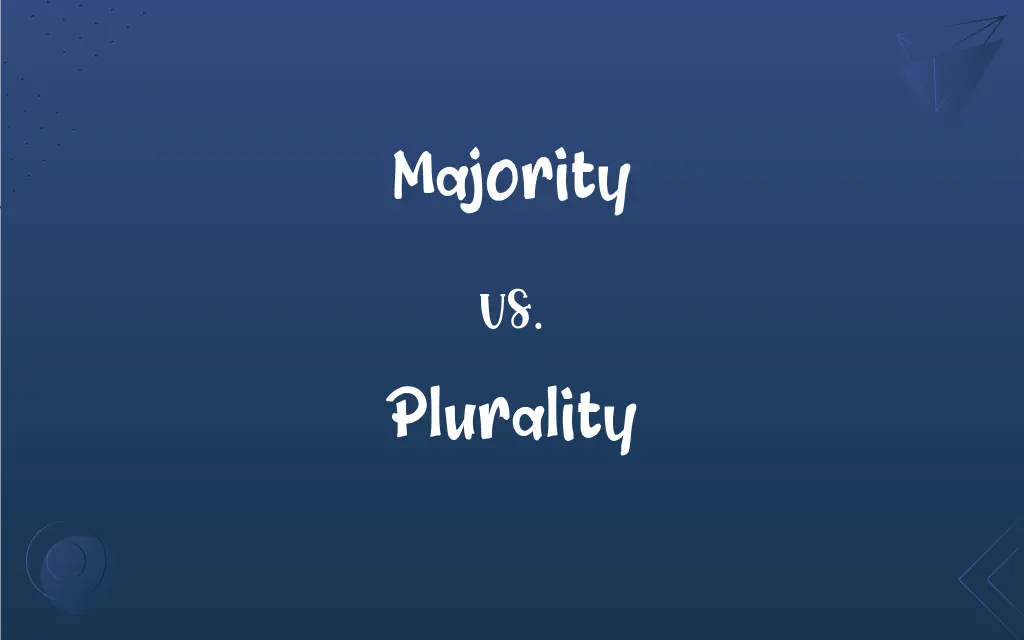Majority vs. Plurality: What's the Difference?
Edited by Aimie Carlson || By Janet White || Updated on August 7, 2024
A majority refers to over half of a total, while a plurality means the largest share when no option has a majority.

Key Differences
In the realm of voting and decision-making, the terms Majority and Plurality are frequently employed. A majority denotes when more than half of a total number or amount supports or aligns with a specific choice or side. It signifies a clear endorsement from over 50% of those voting or choosing, and this majority could be by a margin of one or many. On the other hand, Plurality arises when no single option secures over half the votes or selections, but one option does manage to garner more votes than any other. This is often the case in contests with multiple candidates or choices. In such scenarios, even if an option fails to attain the 50% mark, it can still boast a plurality if its tally is greater than that of any other option.
For example, in an election with three candidates, if Candidate A receives 40% of the votes, Candidate B receives 35%, and Candidate C secures 25%, then no candidate has a majority. However, Candidate A has a plurality because they have the most votes.
Understanding the distinction between Majority and Plurality is crucial, especially in democratic processes. While a majority showcases a clear mandate and predominant consensus, a plurality emphasizes that while one option might be leading, it hasn't necessarily garnered the support of over half the participants. Both concepts highlight different facets of group dynamics and decision-making.
Comparison Chart
Definition
More than half of a total
Largest share when no option has a majority
In Elections
A candidate gets over 50% of the votes
Candidate with most votes wins, even if it's under 50%
ADVERTISEMENT
Indication
Clear endorsement by over half the participants
Largest share, but not necessarily the majority's endorsement
Usage
Often used to make definitive decisions
Often seen in multiple choice scenarios
Outcome
Decisive and clear-cut result
Might result in further rounds or tiebreakers in some systems
Majority and Plurality Definitions
Majority
More than half of a total number or amount.
The majority of the audience liked the play.
Plurality
A large number of something.
A plurality of ideas was discussed in the meeting.
ADVERTISEMENT
Majority
The difference between the winning vote and the rest.
The mayor won by a majority of 2,000 votes.
Plurality
The number of votes cast for a candidate who receives more than any other but does not receive an absolute majority.
In the election, she won by a plurality.
Majority
Superiority in number or quantity.
The majority of the islands remain uninhabited.
Plurality
The fact of being numerous.
The festival celebrated the plurality of arts.
Majority
The greater number or part; a number more than half of the total.
Plurality
A circumstance wherein multiple options are considered.
The plurality of choices made it hard for him to decide.
Majority
The amount by which the greater number of votes cast, as in an election, exceeds the total number of remaining votes.
Plurality
The state or fact of being plural.
Majority
The political party, group, or faction having the most power by virtue of its larger representation or electoral strength.
Plurality
A large number or amount; a multitude.
Majority
(Law) The age at which a person is recognized as an adult by the law.
Plurality
Pluralism.
Majority
The military rank, commission, or office of a major.
Plurality
The offices or benefices held by a pluralist.
Majority
More than half (50%) of some group.
The majority agreed that the new proposal was the best.
Those opposing the building plans were in the majority, so the building project was canceled.
Plurality
In a contest of more than two choices, the number of votes cast for the winning choice if this number is not more than one half of the total votes cast.
Majority
The difference between the winning vote and the rest of the votes.
The winner with 53% had a 6% majority over the loser with 47%.
Plurality
The number by which the vote of the winning choice in such a contest exceeds that of the closest opponent.
Majority
(dated) Legal adulthood, age of majority.
By the time I reached my majority, I had already been around the world twice.
Plurality
The larger or greater part.
Majority
(UK) The office held by a member of the armed forces in the rank of major.
On receiving the news of his promotion, Charles Snodgrass said he was delighted to be entering his majority.
Plurality
(uncountable) The state of being plural.
Majority
Ancestors; ancestry.
Plurality
(ecclesiastical) The holding of multiple benefices.
Majority
The quality or condition of being major or greater; superiority.
Plurality
(countable) A state of being numerous.
Majority
The greater number; more than half; as, a majority of mankind; a majority of the votes cast.
Plurality
(countable) A number or part of a whole which is greater than any other number or part, but not necessarily a majority.
Majority
Ancestors; ancestry.
Plurality
(countable) A number of votes for a single candidate or position which is greater than the number of votes gained by any other single candidate or position voted for, but which is less than a majority of valid votes cast.
Majority
The amount or number by which one aggregate exceeds all other aggregates with which it is contrasted; especially, the number by which the votes for a successful candidate exceed those for all other candidates; as, he is elected by a majority of five hundred votes. See Plurality.
Plurality
(countable) A margin by which a number exceeds another number, especially of votes.
Majority
The property resulting from being or relating to the greater in number of two parts; the main part;
The majority of his customers prefer it
The bulk of the work is finished
Plurality
(countable) A group of many entities: a large number.
A plurality of ideas were put forth at the meeting, most of which were rejected out of hand.
Majority
(elections) more than half of the votes
Plurality
(countable) A group composed of more than one entity.
Majority
The age at which a person is considered competent to manage their own affairs
Plurality
(of spouses) Polygamy.
Majority
The age when a person is legally considered a full adult.
He will inherit the property when he reaches the majority.
Plurality
(psychology) The condition of a single body/person displaying multiple distinct personas.
Majority
A group making up more than half of a larger group.
The majority of students passed the exam.
Plurality
The state of being plural, or consisting of more than one; a number consisting of two or more of the same kind; as, a plurality of worlds; the plurality of a verb.
Plurality
The greater number; a majority; also, the greatest of several numbers; in elections, the excess of the votes given for one candidate over those given for another, or for any other, candidate. When there are more than two candidates, the one who receives the plurality of votes may have less than a majority. See Majority.
Take the plurality of the world, and they are neither wise nor good.
Plurality
See Plurality of benefices, below.
Plurality
The state of being plural;
To mark plurality, one language may add an extra syllable to the word whereas another may simply change the vowel in the existing final syllable
Plurality
A large indefinite number;
A battalion of ants
A multitude of TV antennas
A plurality of religions
Plurality
(in an election with more than 2 options) the number of votes for the candidate or party receiving the greatest number (but less that half of the votes)
Plurality
The state of being plural.
The plurality of cultures in the city is its strength.
FAQs
Can a candidate win with a plurality in elections?
Yes, a candidate can win with the most votes even if it's less than 50%.
Why is understanding the difference between majority and plurality important?
It's crucial for understanding election outcomes and decision-making processes in groups.
Is majority rule always fair?
While majority rule is a foundation of many democratic systems, it may sometimes overlook minority interests.
How is plurality determined?
Plurality is determined by identifying the option with the most votes, even if it's less than 50%.
Can there be a tie in a plurality?
Yes, two or more options can have an equal number of votes, resulting in a tie.
Is a majority always absolute?
No, a simple majority is over 50%, while an absolute majority considers all eligible votes.
Is the term "simple majority" the same as majority?
Yes, a simple majority means more than half, similar to majority.
Can one candidate have both a majority and plurality?
Yes, if a candidate has over 50% of votes, they have both a majority and a plurality.
What does having a majority imply in an election?
It means a candidate secured over 50% of the votes.
Is a majority always more than 50%?
Yes, a majority always signifies more than half of a total.
When is plurality commonly seen?
Plurality is often seen in elections with multiple candidates where no one secures a majority.
Does plurality always indicate a divided opinion?
Often, but not always. It just indicates no option secured over half the support.
Is a two-thirds vote a majority?
Yes, a two-thirds vote is a type of supermajority.
What happens if no option achieves a majority?
The option with the most votes (plurality) might win, or further rounds of voting might be required.
Are there systems that require a majority to win, not just a plurality?
Yes, some systems have runoff elections if no candidate secures a majority initially.
Can a candidate with a plurality claim a clear mandate?
Not necessarily, as they didn't secure over 50% of votes.
In what scenarios is a supermajority required?
Supermajorities are often required for constitutional changes or significant legislative decisions.
Is plurality the same as relative majority?
Yes, both terms are often used interchangeably.
Can there be multiple pluralities in a vote?
No, only one option can have the most votes, but there can be ties.
Why might some prefer a majority system over a plurality system?
A majority system can provide clearer mandates and potentially more stable governance.
About Author
Written by
Janet WhiteJanet White has been an esteemed writer and blogger for Difference Wiki. Holding a Master's degree in Science and Medical Journalism from the prestigious Boston University, she has consistently demonstrated her expertise and passion for her field. When she's not immersed in her work, Janet relishes her time exercising, delving into a good book, and cherishing moments with friends and family.
Edited by
Aimie CarlsonAimie Carlson, holding a master's degree in English literature, is a fervent English language enthusiast. She lends her writing talents to Difference Wiki, a prominent website that specializes in comparisons, offering readers insightful analyses that both captivate and inform.








































































